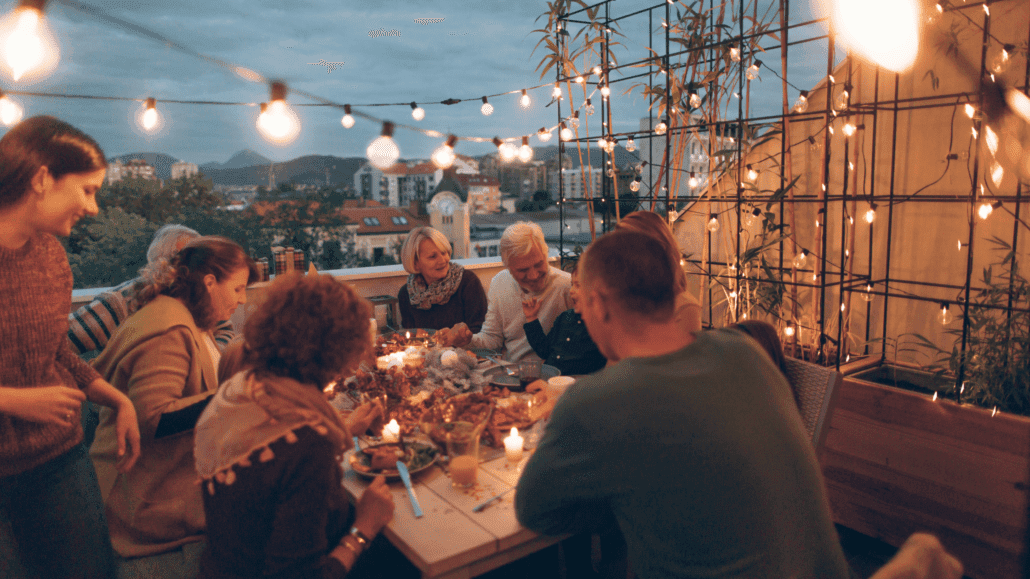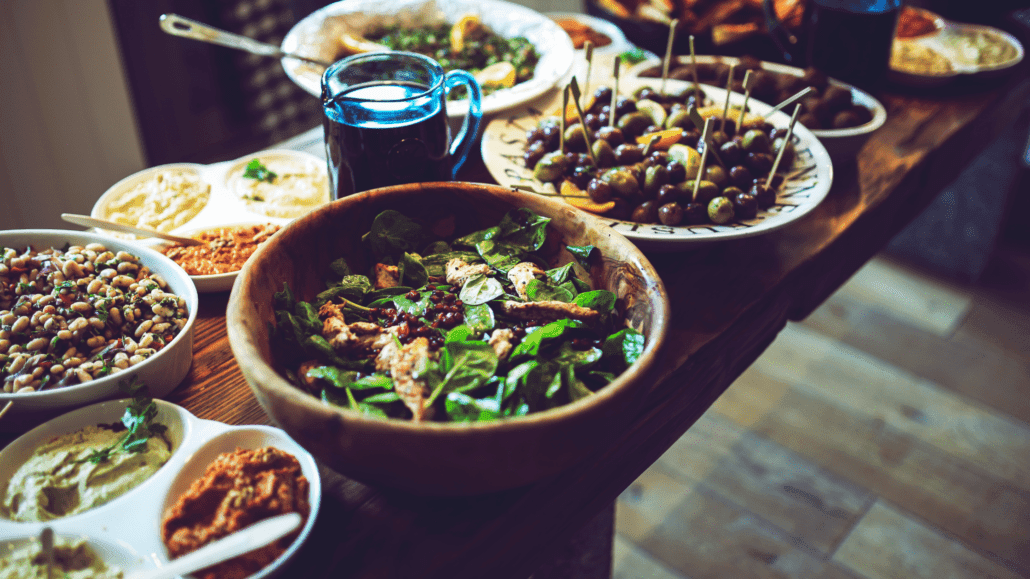Why Every TV Series Is Like Thanksgiving
This week, we’re going to talk about Thanksgiving. We’re not just going to talk about turkeys and football, though. We’re going to talk about television.
Everything you need to know about how to write a TV series you can learn at Thanksgiving.
I’m going to encourage you just for a moment to think back to your very first Thanksgiving. Don’t think about the way it was supposed to be. Think about the way it was.
Maybe your first Thanksgiving (or at least the first Thanksgiving you remember) was a wonderful experience filled with beauty and connection and laughter and love.
Maybe the first Thanksgiving you remember was a terrifying experience filled with stress and anxiety and people misbehaving and family not getting along and tearing each other apart.
If you’re like most people, your first Thanksgiving was probably a really complicated mixture of beauty and drama and pressure and tension and joy and laughter and love and all the things that go into family.
(If you don’t celebrate Thanksgiving, you can substitute any holiday that mattered to you where your family gathered together.)
You probably realize that there are certain rituals that tend to happen in this genre of holiday.
At Thanksgiving, you’re going to eat way too much food, you’re going to talk about tryptophan as if it was something that you just discovered for the first time. You’re probably going to retire to watch football (or if you’re not a football family, maybe you’re going to sit around and play board games or just chat). You’re going to eat dinner earlier than you’re used to. You’re going to cook more food than anybody should. You’re going to wake up at two in the morning and make a stuffing sandwich.
Just like there are certain elements that tend to be part of almost everybody’s Thanksgiving, there are certain elements that tend to be part of every genre of TV show.
If you’re writing an action TV series, there are going to be a bunch of action sequences. It’s just gonna happen.
If you’re writing a drama series, there are going to be tears, there’s going to be pressure, and there are going to be hard decisions.
If you’re writing a comedy series, there are going to be jokes.
If you’re writing a thriller series, there are going to be thrills.
If you’re writing a horror series, there is going to be blood and gore.
If you’re writing an elevated horror series, there is going to be a spiritual transcendent level to it.
There are certain kinds of plot elements that tend to happen in every series, just like there are certain plot elements that happen in every holiday.
If you think back to your first Thanksgiving you’ll probably realize that in every Thanksgiving that followed, you either tried to replicate or change that first feeling that you had. That in some way you’ve either been chasing that feeling for every Thanksgiving of your life, or the longing for a different feeling… of what Thanksgiving could have been, or should have been, or one day could be.
And you’ll start to realize that your first Thanksgiving is really just a pilot episode for every Thanksgiving that followed. That Thanksgiving is a series that keeps you coming back, year after year, for laughter, drama, tears, and connection.
Thanksgiving is a series that keeps you coming back for a feeling— a feeling you either hope to one day experience or long to experience again.
So what was it that gave you that feeling? That kept you coming back, no matter what happened, “episode” after “episode,” year after year?
It was the same elements that make a successful engine of a TV Series…”
If you think about it long enough, you’ll realize it wasn’t the turkey that gave you that feeling that made you keep coming back every year. It wasn’t the genre elements. It wasn’t the plot.
It was the characters.
Similarly, it is not the plot or the genre elements of your TV series that keep people coming back. It’s not the things that you do because they feel necessary for your TV show.
It’s not even the odd things that you do, even though those things are lovely.
It’s the characters that keep people coming back, episode after episode, for your TV series, because it’s the characters that create the engine, just like the characters around your table create the engine of your Thanksgiving.

For example, I have a friend whose family always sings the Turkey Dinner song every Thanksgiving. They started it when they were children, and they still sing it, and now we sing it as well because it’s funny.
But even that is not why Thanksgiving is Thanksgiving.
Thanksgiving is Thanksgiving because of family.
Thanksgiving is Thanksgiving for me because every year, my brother-in-law, Dan, insists Are we ready to sing the turkey dinner song?
Thanksgiving is Thanksgiving because of the joy I get watching Dan make us all sing Turkey Dinner. It’s because of the joy that Dan has in ironically singing this silly Turkey Dinner song. This is what’s really fun.
This is true in feature films as well (and in books and plays). It’s always the characters that we’re connecting to, even though we’ve got to move through certain rituals of plot and genre to experience that connection.
If you’re writing a spy thriller TV series, there had better be spies. If you are writing a Thanksgiving dinner, there better be turkey. Or tofurkey. Or a turducken. Or some kind of family feast.
There are certain plot elements that are necessary and important in a television series, but it’s not the plot elements that make the show special just like it’s not the plot elements that make a movie special. It’s always the characters.
Where feature films and television series start to diverge is that if you’re writing a feature film, you’re not looking for every Thanksgiving. You’re usually looking for exactly the opposite. You’re looking for the Thanksgiving where everything changed.
That Thanksgiving where I finally put my foot down.
That Thanksgiving where I finally agreed to do what Dad always asked me to do.
That Thanksgiving where we had the big family blowout.
The Thanksgiving where we finally came together and recognized how much we all loved each other.
The big hot Thanksgiving, the best Thanksgiving, the worst Thanksgiving, etc.
In particular, we’re looking for the Thanksgiving that is pivotal in the main character’s life.
that pivotal Thanksgiving after which no Thanksgiving will ever be the same and that will give meaning to all the Thanksgivings that came before.
We’re looking for those points of change.
This captures a truth about us as human beings, which is that every single human being in the world longs to change.
We have this thing in us called the nascent ego, that wants to change and to know more. The nascent ego doesn’t really care very much if “more” is happy or sad. It just wants to know, to expand, to test the limits of who you can be.
The nascent ego, the part of you that wants to change, is neither good nor bad. It’s just part of who you are as a human being, a part of who we all are.
We all want to expand ourselves. We all want to change. We all long for something better. We all long to step out of normal. We buy a brand new car, it’s the coolest car ever, and after it becomes “our” car we want a new car. That’s the nascent ego.
We show up for the job at 7/11, or the accounting firm, or the law office, or the production office, or whatever day job we have. Then one day, we say, No, I long for something more.
This is the nascent ego, this is the part of us that wants to change.
Feature films tend to capture us at that moment of nascent ego taking over, that moment where we’re going to change.
Think about who you were at your first Thanksgiving. You’re not the same person now. Why are you not the same person now? You made big choices.
Some of them might have been beautiful choices, some of them might have been tragic choices, but you made huge choices and those choices sent you on a journey of change. You wanted things, obstacles came in between you and your wants, and those choices led you to become who you are today just like the next choices you make will lead you to become the person that you are tomorrow.
Feature films capture that journey of change. They capture those pivotal times in our lives.
Television series work differently.
Television series still capture change, but they also capture another part of us called the holdfast ego. Television shows capture the part of us that wants to stay the same, the part of us that wants every Thanksgiving to be like that first Thanksgiving.

The nascent ego has that first Thanksgiving and says, Next year, maybe we could have two turkeys! Next year, maybe we could decorate the house. Next year, maybe we could have even more family over…
The nascent ego wants to change. The holdfast ego wants Thanksgiving next year to feel exactly like Thanksgiving this year. It wants Thanksgiving to feel the same every single time.
Even as we change and grow older, we still want that feeling that we had as a child. That’s what we are chasing. We show up and we do these rituals together and some of them are beautiful rituals, and some of them are destructive rituals, but we do these rituals together. We come together with family members that we see all the time and family members that we don’t see enough and we come together because we are all chasing a feeling.
Sometimes we get the feeling, and sometimes we don’t get the feeling, but that’s why we come. We’re coming for the feeling.
There’s an infrastructure to it. There’s a certain series of rituals that you do inside that infrastructure. But ultimately it’s not the infrastructure we’re chasing. It’s the feeling.
What we’re really going for in a television series is the feeling of these characters coming together in every episode of every season in a way that is both the same, but also different.
Now, don’t get me wrong. Feature films also deal with the holdfast ego. Just like series also deal with the nascent ego. They just deal with them differently.
If you want to write a feature, you can think of your job as simply to activate the nascent ego in a character and then punish that character for changing so that their holdfast ego tries to take control back from their nascent ego.
The difference is, feature films tend to build to climax and catharsis, to this feeling that life is going to go on either happily ever after or sadly ever after.
TV is different. TV first allows, and then denies catharsis, usually until the final episode.
The pilot of a television series is just like a feature film. It has to capture that amazing Thanksgiving or that horrible Thanksgiving. It has to capture that first Thanksgiving that says, This is what Thanksgiving feels like.
A television pilot has to establish an expectation and suck you into a world that says, Here are the characters. Here’s this tremendous journey of change. Here’s this tremendous problem that they’re dealing with.
If you look at Succession, that series pilot establishes an expectation that says, Here are the characters: The great lion has fallen and the cubs are going to tear each other apart trying to get the crown.
If you look at Curb Your Enthusiasm, that series pilot establishes an expectation that says, Here’s this guy named Larry David who just can’t do the things that everybody else can do out of common courtesy.
All that’s really happening in a television pilot is we’re just meeting the characters who will make up Thanksgiving for the rest of the series.
Here’s Jeff, Larry’s agent and best friend in the world. Jeff thinks every idea Larry has is absolutely brilliant. Jeff agrees with everything Larry says. He’s a total philanderer and his wife hates Larry with every bone in her body, but she somehow always ends up engaging with him.
Larry’s wonderful wife is just a lovely person who kind of puts up with all of Larry’s craziness again and again.
Television is like Thanksgiving. That’s why we say, Oh, I get it, I get how it works! We’re gonna watch Larry get put in a position where he should be able to apologize but can’t, and things are going to get worse and worse and worse until we feel real shame for Larry, and we start to feel like we just can’t watch, but we’re also going to laugh. This is Thanksgiving.
The TV pilot is like the special Thanksgiving. The pilot creates a craving in us to get together with these people again, in all their beauty and all their horror, and have an experience like that again.
A TV pilot introduces us to the characters who become our family throughout the rest of the series.

There’s a reason that every TV series focuses around a family. I believe it’s because they become our extended family. We invite these characters into our living rooms as part of our ritual. Whether it’s a binging ritual, or once a week on Sundays at 9 pm ritual, we invite them into our homes, and they become part of our family.
Our expectation in a television series, just like at Thanksgiving, is that mom will act like mom, dad will act like dad, and your crazy cousin will act like your crazy cousin.
Even if a part of you hopes, Wouldn’t it be nice if dad was different? Wouldn’t it be nice if mom was different? Wouldn’t it be nice if my crazy cousin was different? There’s a part of you that knows if they were different, Thanksgiving wouldn’t feel like Thanksgiving anymore.
What TV series do so beautifully is they capture the holdfast part of us that needs things to stay the same even when they change. TV series capture the cycles in us.
TV series can also evolve and change, and characters inside of TV series can evolve and change just like we can. Characters don’t have to stay who they are, just like we don’t have to stay who we are.
You are not the same person you were at your very first Thanksgiving.
I would guess that the rituals of your Thanksgiving have also changed.
I would guess some of the people who were at your first Thanksgiving are probably no longer with you.
I would guess that some of the people who were not at your first Thanksgiving, whom you didn’t even know, are now a core part of what Thanksgiving is to you.
I would guess that every single person in your family has both changed and also failed to change, has both broken out of old patterns and reenacted old patterns over time.
This is what TV series are about. This is what engine is about.
Writing a TV series is not about the plot that happens to happen. It’s about how to make this Thanksgiving feel like all the previous Thanksgivings, but also feel different.
How can we get different plot year after year, episode after episode, season after season while keeping everything the same? How can different kinds of things happen, but mom still feels like mom, even if she’s changing, and dad still feels like dad, even if he’s changing, and crazy cousin still feels like crazy cousin, even if he’s changing?
This is what I find beautiful about TV series. TV series tell us a different kind of truth than feature films. Neither one is any more or less true than the other.
Feature films tell us the “happily ever after” and “sadly ever after” stories. While these incredibly complicated TV series have the ability to tell us different kinds of stories that look more like our actual lives: stories about how we both change and also stay the same, about how we evolve but also enact the same old patterns, about how Thanksgiving stays Thanksgiving, our family stays our family, even as we grow and change.
Where does this feeling come from? This feeling comes from characters.
This feeling comes from beautiful and broken people, flawed and wonderful people, transcendent and fallen people, complicated and messy people. That is what TV series and its engine are built on.
When you’re building the engine of your TV series, all you have to do is think about Thanksgiving dinner.

Think about capturing the feeling of that first Thanksgiving. Then ask yourself, How do the characters show up as themselves episode after episode after episode? How do they enact the same patterns even as they change? How does Thanksgiving still feel like Thanksgiving even when those patterns get broken? How does each episode of the series still feel like the pilot (that is your engine!).
As you head into your Thanksgiving (or other family gatherings), I wish you the gift of both changing and failing to change.
I wish you the gift of both nascent and holdfast ego.
I wish you the gift of enjoying the engine that brings your family together, not necessarily in a perfect way, but in a beautiful way.
And I hope that your Thanksgiving is filled with inspiration.
Enjoying this podcast? Well, get some more for free! We’re having our second annual Pitch Festivus event on Thursday, December 9th, it’s 7 – 9 Eastern, 4 – 7 Pacific. Top Faculty members at Jacob Krueger Studio and myself, we’re going to be sharing some of our best insights about pitching. You’ll have a chance to be selected for a chance to pitch, you can win some amazing prizes, connect with our community. It’s gonna be awesome! You can find out more or RSVP at writeyourscreenplay.com/festivus
*edited for length and clarity



